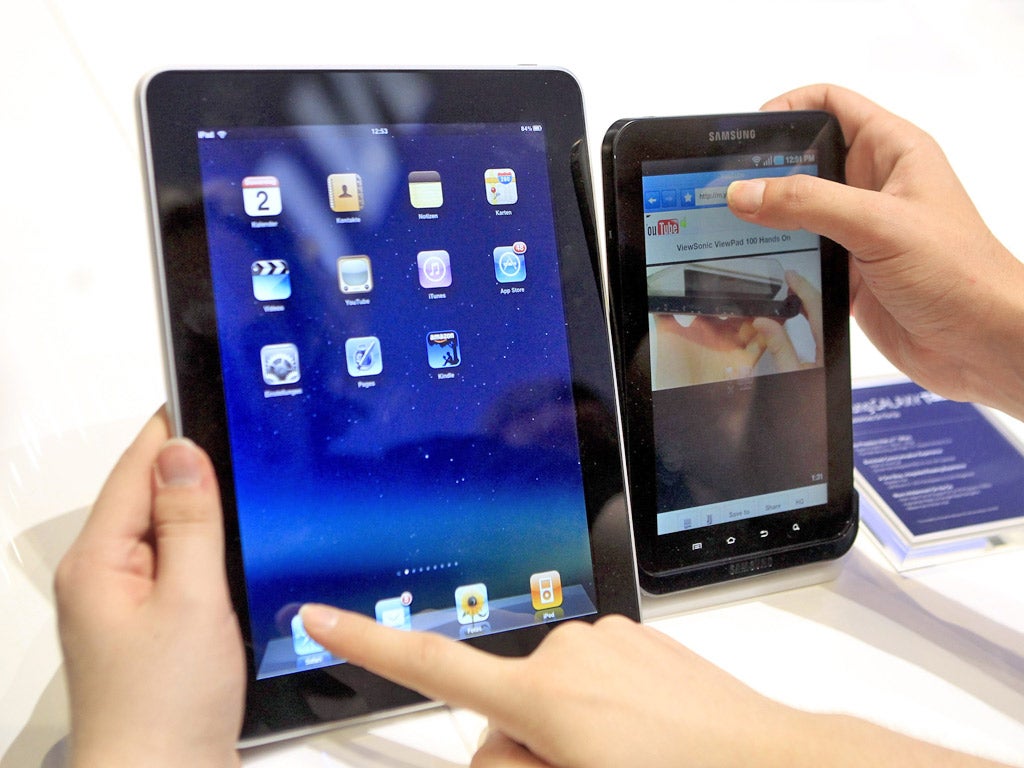The iPad vs the Galaxy Tab: Apple loses Samsung case appeal

Apple lost a Court of Appeal battle today in its legal action over Samsung's Galaxy tablet computer.
The American electronics giant argued that the Samsung Galaxy Tab was too similar to its own product.
But a judge at the High Court in London ruled in July that the Galaxy tablet was not "cool" enough to be confused with Apple's iPad.
Apple later challenged the finding at the Court of Appeal.
But the appeal was dismissed today by Lord Justice Longmore, Lord Justice Kitchin and Sir Robin Jacob.
They upheld the decision of Judge Colin Birss QC that three Samsung Galaxy tablet computers did not infringe Apple's registered design.
Judge Birss said earlier this year: "They do not have the same understated and extreme simplicity which is possessed by the Apple design. They are not as cool."
He said consumers were not likely to get the two tablet computers mixed up.
The judge said: "The informed user's overall impression of each of the Samsung Galaxy tablets is the following: from the front they belong to the family which includes the Apple design; but the Samsung products are very thin, almost insubstantial members of that family with unusual details on the back. The overall impression produced is different."
Apple had argued that the front face and overall shape were the most important factors because the informed user would spend the most time looking at the front and holding it.
In today's ruling, Sir Robin said: "Because this case (and parallel cases in other countries) has generated much publicity, it will avoid confusion to say what this case is about and not about.
"It is not about whether Samsung copied Apple's iPad. Infringement of a registered design does not involve any question of whether there was copying: the issue is simply whether the accused design is too close to the registered design according to the tests laid down in the law."
He added: "So this case is all about, and only about, Apple's registered design and the Samsung products."
Samsung said in a statement: "We welcome the court's judgment, which reaffirmed our position that our Galaxy Tab products do not infringe Apple's registered design right.
"We continue to believe that Apple was not the first to design a tablet with a rectangular shape and rounded corners and that the origins of Apple's registered design features can be found in numerous examples of prior art.
"Should Apple continue to make excessive legal claims in other countries based on such generic designs, innovation in the industry could be harmed and consumer choice unduly limited."
The three Court of Appeal judges also rejected Apple's challenge against an order made by Judge Birss that it must publicise the fact that it had lost the case.
Sir Robin said: "The grant of such an order is not to punish the party concerned for its behaviour. Nor is it to make it grovel - simply to lose face. The test is whether there is a need to dispel commercial uncertainty."
Ruling that an order was necessary, Sir Robin said Apple must make the position clear "that it acknowledges that the court has decided that these Samsung products do not infringe its registered design.
"The acknowledgment must come from the horse's mouth. Nothing short of that will be sure to do the job completely."
PA
Join our commenting forum
Join thought-provoking conversations, follow other Independent readers and see their replies
Comments
Bookmark popover
Removed from bookmarks